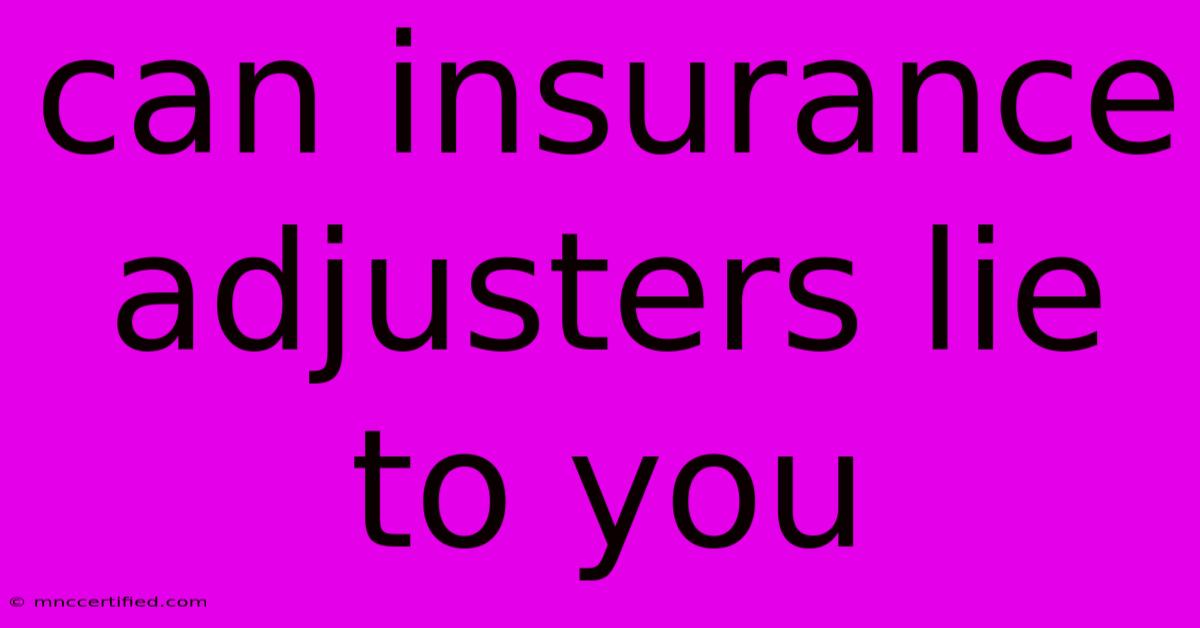Can Insurance Adjusters Lie To You

Table of Contents
Can Insurance Adjusters Lie to You? Understanding Your Rights
The short answer is: no, insurance adjusters should not lie to you. However, the reality is often more nuanced. While outright lies are unethical and potentially illegal, adjusters may employ tactics that feel misleading or manipulative. Understanding these tactics and your rights is crucial to protecting yourself after an accident or loss.
What Insurance Adjusters Do (and Don't Do)
Insurance adjusters are employed by insurance companies to investigate claims and determine the appropriate compensation. Their job is to fairly assess the damages and settle claims efficiently, minimizing payouts for the insurance company. This inherent conflict of interest is why it's vital to be informed and assertive. They should be:
- Impartial investigators: Objectively assessing the facts of the case.
- Informative: Clearly explaining the claims process and your rights.
- Fair negotiators: Offering a reasonable settlement based on the damages.
They should not be:
- Deceptive: Withholding information or providing false information.
- Pressuring: Coercing you into accepting a settlement you're not comfortable with.
- Unresponsive: Ignoring your calls, emails, or other attempts to communicate.
Common Tactics That Feel Like Lying
While a blatant lie might be rare (and easily provable), adjusters might use these subtle but potentially harmful tactics:
1. Lowball Offers:
This is perhaps the most common tactic. Adjusters may offer a significantly lower settlement than the actual value of your damages. They might justify this with seemingly reasonable explanations, but these explanations may omit crucial details or undervalue your losses. Always get a second opinion from an independent appraiser or attorney.
2. Omitting Information:
Adjusters might selectively present information that favors the insurance company. They might downplay the severity of your injuries or damage to your property. Keep detailed records of everything, including photos, videos, medical bills, and repair estimates.
3. Using Legalese and Jargon:
Complex insurance terminology can be confusing, allowing adjusters to subtly mislead you without technically lying. Don't hesitate to ask for clarification on anything you don't understand. If necessary, consult with a legal professional.
4. Creating a Sense of Urgency:
Adjusters might pressure you to accept a quick settlement, suggesting that delaying will reduce your payout. Never feel rushed into making a decision. Take your time, gather all necessary information, and seek advice from professionals.
5. Minimizing Your Injuries or Damages:
They might suggest your injuries are less serious than they are or that the damage to your property is easily repairable at a much lower cost. Get thorough medical evaluations and obtain multiple repair estimates from reputable sources.
Protecting Yourself Against Misleading Tactics
- Document Everything: Maintain thorough records of all communication, medical bills, repair estimates, and photos/videos related to your claim.
- Seek Independent Advice: Consult with an attorney or independent appraiser before accepting any settlement.
- Understand Your Policy: Carefully review your insurance policy to understand your coverage and rights.
- Record Conversations: If you feel uncomfortable, consider recording conversations with the adjuster (check local laws regarding recording conversations).
- Be Assertive but Professional: Don't be afraid to question the adjuster's assessment or ask for more information.
When to Consult a Lawyer
If you suspect an adjuster has intentionally misled you or violated your rights, consult with a personal injury or insurance attorney. They can advise you on your legal options and help you pursue a fair settlement. Remember, you have rights, and you shouldn't be afraid to assert them.
This article provides general information and does not constitute legal advice. Consult with a legal professional for advice specific to your situation.

Thank you for visiting our website wich cover about Can Insurance Adjusters Lie To You. We hope the information provided has been useful to you. Feel free to contact us if you have any questions or need further assistance. See you next time and dont miss to bookmark.
Featured Posts
-
Jobs At National General Insurance
Nov 17, 2024
-
Does Quest Take Ambetter Insurance
Nov 17, 2024
-
Colorados Hunter Penalty For Hit
Nov 17, 2024
-
Lawyers To Sue Insurance Companies
Nov 17, 2024
-
Rugby England Vs South Africa Live Score
Nov 17, 2024